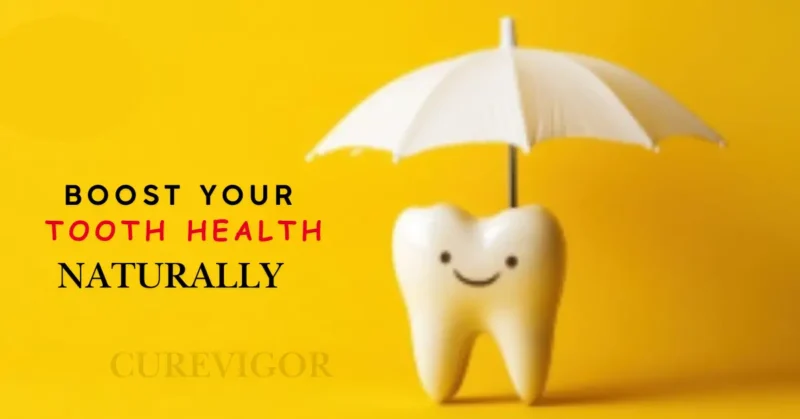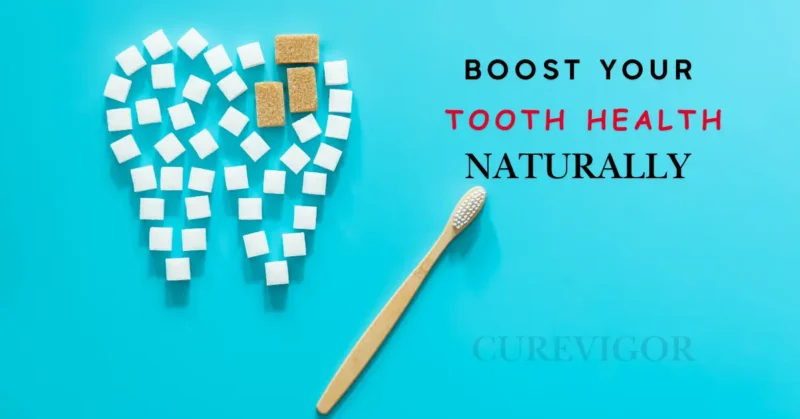Learn expert tips to boost your tooth health naturally. Strengthen teeth, prevent decay, and achieve a healthier, brighter smile—naturally.
Thank you for reading this post, don't forget to subscribe!Your smile says more about you than words ever could — and keeping it healthy doesn’t have to rely on chemicals or costly treatments.
With a few natural habits and expert-approved tips, you can protect your tooth health, strengthen your enamel, and enjoy a confident, radiant smile the natural way.
How to Boost Your Tooth Health Naturally for a Healthier Smile

Having good tooth health is essential for a confident and beautiful smile — but it’s about much more than appearance. Healthy teeth and gums reflect your body’s overall wellness.
From the strength of your immune system to your digestion and even your heart health, your mouth plays a vital role.
While brushing and flossing are foundational, nature offers a powerful toolkit to strengthen and protect your teeth naturally. This guide explores what tooth health really means, how to care for it using natural methods, and why expert-backed habits can transform your oral health for life.
Understanding Tooth Health
When people think of “good teeth,” they usually picture bright white smiles. But tooth health goes beyond color or shine. It’s about keeping every part of your mouth — teeth, gums, bones, and connective tissues — in balance and free of disease.
Your mouth is home to billions of bacteria, both good and bad. The goal isn’t to eliminate them all, but to keep the balance in favor of the good ones.
Bad dental hygiene promotes the growth of dangerous germs, which can cause inflammation, infection, and decay, impacting your whole body.
Common Problems Linked to Poor Tooth Health
1. Tooth Decay
Tooth decay is one of the most common oral issues worldwide. It starts when bacteria in your mouth break down food particles, especially sugars, and produce acid.
Your dental enamel, the firm outer layer that shields your teeth, is gradually eroded by this acid. Cavities can cause discomfort, sensitivity, and infection if they are not treated.
2. Gum Disease
The basis of good teeth is healthy gums. Gum disease starts when plaque accumulates along the gum line. It is sometimes referred to as gingivitis or periodontitis (in more severe stages).
Gum irritation from this accumulation results in bleeding, edema, and redness. If left untreated, the infection may extend to the tooth-supporting bone, resulting in tooth loss or loose teeth.
3. Bad Breath (Halitosis)
Gum disease or inadequate dental hygiene are frequently the causes of persistent bad breath. Bacteria trapped in your mouth release sulfur compounds that smell unpleasant. Addressing the root cause — bacteria and plaque buildup — is key to freshening your breath naturally.
Tips for Boosting Tooth Health Naturally

You don’t need to rely solely on commercial products for a healthy smile. A combination of good hygiene, wise dietary choices, and natural remedies can keep your teeth strong and gums resilient.
1. Brush and Floss Regularly
It might sound obvious, but many people underestimate the importance of consistent brushing and flossing. You can finish removing plaque from your teeth by brushing twice a day with a soft-bristle toothbrush and in gentle circular strokes.
If your toothbrush can’t reach plaque and food particles, floss once a day.
These simple habits prevent decay, gum inflammation, and even discoloration.
2. Use a Fluoride Toothpaste
A naturally occurring mineral called fluoride fortifies enamel and increases its resistance to acid assaults. Look for toothpaste with fluoride to help remineralize weakened enamel and prevent cavities.
If you prefer a natural option, choose fluoride toothpastes made with plant-based ingredients and essential oils — they’re gentle yet effective.
3. Eat a Balanced Diet
What you eat has a direct impact on tooth health. Strong enamel and healthy gums are produced by your body when you eat a diet consisting of complete foods, particularly those high in vitamins, minerals, and antioxidants.
- Calcium and phosphorus (found in dairy, almonds, and leafy greens) rebuild enamel.
- Vitamin D (from sunlight, eggs, and fatty fish) helps your body absorb calcium.
- Vitamin C (in citrus fruits and peppers) keeps gums strong and reduces inflammation.
- Antioxidants (from berries, green tea, and nuts) fight bacteria and free radicals in the mouth.
Think of your mouth as the first stage of digestion — nourish it well, and the rest of your body benefits too.
4. Avoid Sugary and Acidic Foods
The biggest threat to tooth health is sugar. Sugar and oral bacteria combine to form acid, which breaks down enamel. Fruit juices, candy, pastries, and soft beverages can all hasten this process.
Acidic foods like citrus, vinegar, and carbonated drinks can also wear away enamel over time. To avoid damaging your enamel, wait at least half an hour before brushing and rinse your mouth with water after consuming acidic foods and drinks.
5. Use Natural Mouthwashes
Commercial mouthwashes often contain alcohol and artificial additives that can dry out your mouth. Bacteria thrive in a dry mouth. Instead, try natural mouthwashes made with ingredients like tea tree oil, peppermint, or aloe vera.
These natural options help kill bacteria, reduce inflammation, and freshen your breath without disrupting your mouth’s healthy microbiome.
Natural Remedies for Tooth Health
If you’re looking for time-tested, gentle ways to enhance your tooth health, several natural remedies can help cleanse, strengthen, and soothe your mouth.
1. Oil Pulling
An ancient Ayurvedic technique called “oil pulling” is swishing oil—typically coconut, sesame, or sunflower oil—in your mouth for ten to fifteen minutes before spitting it out. The oil acts like a magnet for toxins and bacteria, helping to cleanse the mouth and promote healthy gums.
Coconut oil is especially effective due to its antimicrobial properties. Studies suggest regular oil pulling can reduce plaque, improve gum health, and even whiten teeth naturally.
How to do it:
- Take one tablespoon of coconut oil.
- Swish it around in your mouth gently for 10–15 minutes.
- Because oil can clog pipes, dispose of it in a garbage can rather than the sink.
- Brush your teeth after rinsing with warm water.
2. Salt Water Rinse
Salt is a natural disinfectant that soothes inflamed gums and promotes healing. Rinsing with a warm salt water solution helps cut down on bacteria and ease mild irritations or illnesses..
How to make it:
- Mix half a teaspoon of salt in a cup of warm water.
- Swish it in your mouth for 30 seconds.
- Once or twice a day, as needed, spit it out and repeat.
This simple remedy helps maintain gum health and accelerates healing after dental procedures or minor injuries.
3. Clove Oil
Since ancient times, clove oil has been utilized as a natural remedy for toothaches. Eugenol, its primary constituent, possesses potent antibacterial and anti-inflammatory qualities. The affected area can experience less pain and edema if diluted clove oil is applied.
How to use:
- Combine a small amount of clove oil with a carrier oil, such as coconut and olive oil.
- Apply gently to the sore area using a cotton swab.
- Avoid using undiluted clove oil, as it can irritate the gums.
In addition to being a natural breath refresher, clove oil can aid in the fight against bacteria that cause gum disease and cavities.
Importance of Regular Dental Check-Ups
Even if you follow the best natural practices, professional care remains vital. Regular dental check-ups serve as both a preventive and diagnostic measure, helping you maintain long-term tooth health.
1. Prevention
Routine dental visits help stop problems before they start. Dentists can offer individualized care to safeguard your teeth by spotting early indicators of cavities, gum disease, or enamel degradation. Treatment is usually more expensive and more difficult than prevention.
2. Early Detection
Many oral health problems develop silently. Small cavities, gum inflammation, or early-stage periodontal disease may not cause pain initially. Your dentist can identify these problems early on, when treatment is simpler and less intrusive, thanks to routine examinations.
3. Professional Cleaning
Plaque can solidify into tartar, which can only be eliminated by a dental hygienist, even with the best brushing and flossing practices. A professional cleaning every six months helps eliminate buildup, polish your teeth, and prevent gum disease. It also gives you that clean, fresh feeling you just can’t get from home care alone.
The Mind-Body Connection: Why Tooth Health Reflects Overall Wellness
Your oral health and the rest of your body are interconnected. In fact, systemic disorders like diabetes, heart disease, and even Alzheimer’s have been connected by experts to poor dental health. Inflammation in your gums can spread bacteria into your bloodstream, triggering chronic inflammation throughout your body.
A healthy mouth, on the other hand, supports better digestion, stronger immunity, and even improved mood and confidence. Taking care of your teeth naturally is an investment in your entire body’s health.
Lifestyle Habits That Support Strong Teeth
Beyond brushing and diet, your daily habits can have a powerful effect on tooth health.
1. Drink plenty of water.
Drinking water facilitates the elimination of food particles and bacteria. Furthermore, it maintains moisture in your mouth, which is essential since saliva strengthens enamel and balances acids. Fluoridated water delivers an extra layer of protection.
2. Quit Smoking
Smoking is one of the biggest threats to oral health. It restricts blood flow to the gums, making them more vulnerable to infection. It also stains your teeth, dulls your taste buds, and increases your risk of oral cancer. Quitting smoking can dramatically improve your gum health and restore your smile’s natural vibrancy.
3. Chew Gum Without Sugar
After meals, chewing sugar-free gum increases salivation, which neutralizes acids and remineralizes enamel. Select gums sweetened with xylitol, a naturally occurring sugar alcohol that prevents dangerous bacteria from growing.
4. Manage Stress
Prolonged stress can induce bruxism, or tooth grinding, which erodes enamel and hurts the jaw. Relaxation techniques like meditation, yoga, or even deep breathing can help protect your teeth and your mental health.
A Natural Approach to a Brighter, Healthier Smile
Nature has given us all the tools we need to maintain strong, healthy teeth. By combining mindful daily habits, nutrient-rich foods, and time-tested natural remedies, you can achieve lasting tooth health — without harsh chemicals or expensive treatments.
Keep in mind that your grin is an expression of your inner health. Take care of your teeth, and they’ll take care of you.
Final Thoughts
Boosting your tooth health naturally isn’t complicated — it’s about being consistent, informed, and gentle with your mouth. Brush and floss regularly, choose whole foods over processed ones, use natural cleansers like oil pulling or salt rinses, and never skip your dental check-ups.
The result? A stronger, brighter, and healthier smile that radiates confidence and vitality.
Read more Health & Beauty Tips.
You might like:

